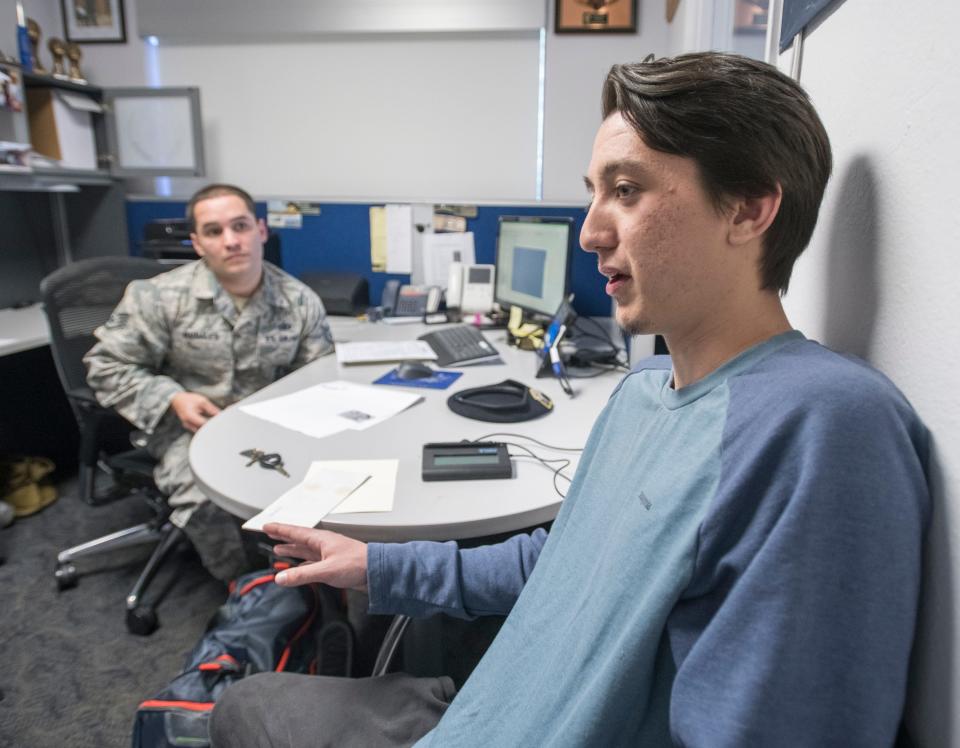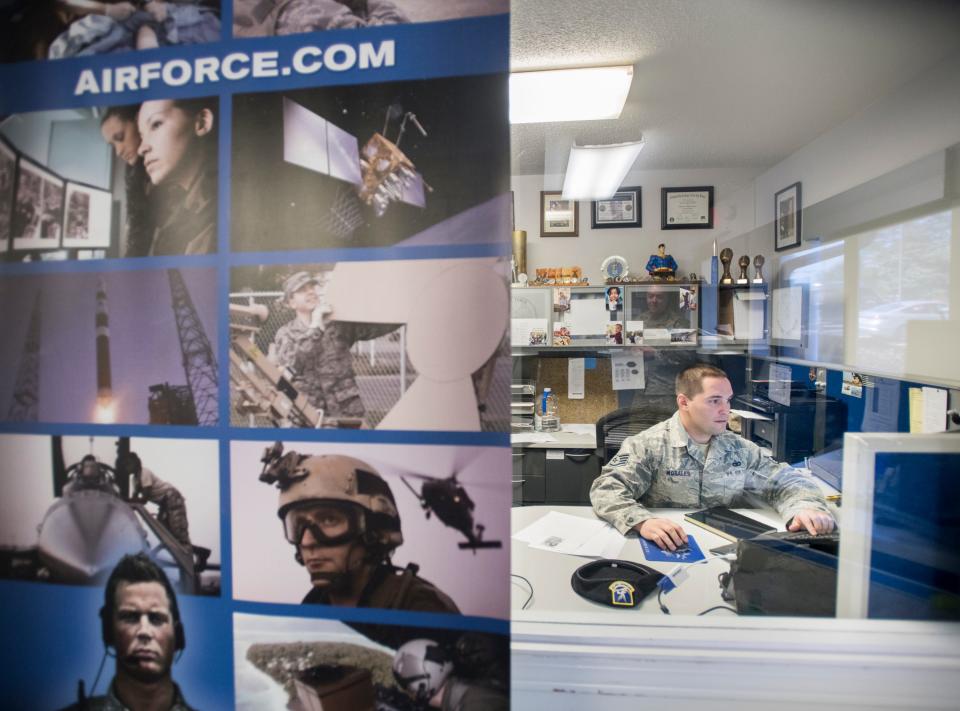As pool of eligible recruits shrinks, military branches compete more than ever for enlistees
PENSACOLA, Fla. – Recent high school graduate Cameron Newton, 19, spent a year working at a Pensacola Beach seafood restaurant but wasn't sure about his long-term life plans. Growing up near Naval Air Station Pensacola, he thought about joining the Navy.
"But I didn't want to be on a boat," Newton said.
And the Army?
"That just isn't for me," he said.
So Newton ended up in the office of Air Force recruiter Sgt. Carlos Morales, where he signed his final paperwork this summer before heading off to basic training at Lackland Air Force Base in San Antonio.
Experts say Newton fits the profile of a typical 17- to 24-year-old who would be likely to enlist in the military – his father also served in the military, he grew up near a military base and he is from the South, where a disproportionate number of high school graduates enlist.
More: House votes to block ban on transgender military service

But recruiters like Morales are having to work harder than ever to attract people like Newton to their service branches at a time when the job market is good, the pool of potential recruits is low because so many don't meet basic fitness standards and the general public is weary of American involvement in international conflicts.
And military experts say the need for recruits is acute as the military looks for young people with high-tech skills to combat growing cyber threats from other countries. Without fresh talent entering the military's ranks, the nation could be vulnerable for decades to come, they say.
A battle for eligible recruits
According to 2017 Pentagon data, 71% of Americans ages 17 to 24 are ineligible to join the military because of obesity, lack of a high school diploma or a criminal record. The 29% who could make the cut are likely to pursue other opportunities, said Beth Asch, a senior economist at the Rand Corp. who has studied military recruitment for decades.
"Recruiters are competing against colleges and the job market," she said. "Recruiting is tough because most people have to be sold on the opportunities that joining the military can provide."
And the military no longer needs "grunts," she said. All service branches are looking for recruits who score well on aptitude tests.
"Even those things that we once kind of thought of like grunt work require technology skills and multitasking because (people) have to take in a lot information from a lot of sources simultaneously in most jobs," she said.

Matthew Jeffries served in Iraq and Afghanistan with the Army before leaving the military to start his own Pensacola-based business getting potential recruits who have been rejected by service branches in shape to serve.
Most of Jeffries' clients scored well on aptitude tests, but do not meet the military's fitness standards. The biggest reason his clients are rejected is obesity, he said.
"If someone is coming to me, they are willing to serve and they want to join. I am just trying to address one issue," he said.
While Jeffries works to get members of the military-aged generation in shape, he said his real concern is for the future.
"The real question is what will we do to reach the elementary school-aged kids that are coming up?" said Jeffries.
"There are so many factors, and how we solve it is a billion-dollar question," he said.
More: 71% of young people are ineligible for the military — and most careers, too
Looking to cities for recruits
In the meantime, competing for those who are eligible is getting incredibly difficult.
Adding to the military's recruitment woes, it is a challenge to even reach qualified potential recruits these days because they are unlikely to tune in to traditional media or answer unsolicited phone calls.
The military is having to adapt its sales pitch to Generation Z, kids born after millennials who are permanently attached to their cellphones.
The Army fell short of its 80,000-soldier recruiting goal by 6,500 recruits last year and has since restructured its Fort Knox, Kentucky, recruiting command in an effort improve the numbers.
Among many other initiatives, the Army is reaching out to urban areas where it has not traditionally found recruits, said Lisa Ferguson, spokeswoman for recruiting command. In Florida, the initiative includes Orlando and Miami.
The Army is reaching out to potential recruits in those cities on Twitter and through other forms of social media.
"What we have found is that as you get further and further away from towns with military installations, there is less knowledge of the military," said Sgt. Robert Dodge, another spokesman for the command.
Dodge said the Army is using demographic data to market itself in large cities, block by block.
For example, a pilot program in Chicago is zeroing in on specific neighborhoods and looking at how the Army can best pitch itself to recruits in those neighborhoods. This summer, the pilot will be expanding to Boston, he said.
"There are some areas where health care resonates, there are others where it's the opportunity to travel and others where it's leadership," he said.
But, Dodge said, the biggest factor in talking to 17- to 24-year olds in 2019 is authenticity.
"Across the board, what we have found is the most important thing is that the recruiter is truthful about the good, the bad and the ugly. Today's youth will fact check you on everything. They will put a peg on you when you haven't been truthful with them," he said.
Q&A: Male-only military draft ruled unconstitutional. What happens now?
Afraid to call a 17-year-old
Bestselling business author Jeb Blount was surprised when his company began receiving large book orders from military bases.
He did a little investigating and found out the orders were for classes to teach recruiters how to do the job.
"I write sales and business books, but I hadn't thought of military recruiting like a business before," said Blount, who became so interested in the issue that he reached out to the Army and traveled to Fort William Henry Harrison in Montana to meet with recruiters.

After talking with the recruiters, he learned they were doing one of the hardest jobs in the military with very little preparation.
"I realized everyone in the room had been in combat, but they were all afraid to talk to a 17-year-old on the phone," he said. "That was an 'aha' moment for me; recruiting is one of the hardest and least appreciated jobs in the military."
Teaching recruiters to make the pitch
The experience led to Blount's new book, "Fanatical Military Recruiting – High Impact Prospecting." He wrote the book after spending time with recruiters in offices all over the country.
Blount said military recruiters in 2019 are facing a "perfect storm."
"The biggest problem is that there is such a small number of eligible recruits and those who are qualified have so many options," he said. "But the entire strength of military is on the backs of those recruiters and I don't think the public sees them in the way they should."
Among other lessons, Blount taught the recruiters to work on making an emotional connection with potential recruits. He told them to talk to the potential enlistees rather than talking at them. He also told them to listen to what they had to say rather than telling them about their own stories of military service.
"It's about connecting the dots between your story and their story and building that connection," he said.
Unlike other sales jobs, the recruiters actually have money and opportunities to give away. Their problem is getting in the door, he said.
This article originally appeared on Pensacola News Journal: As pool of eligible recruits shrinks, military branches compete more than ever for enlistees

